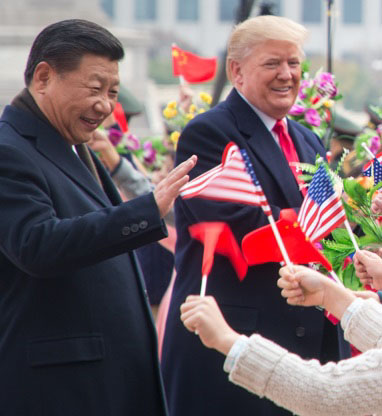by WorldTribune Staff, June 16, 2019
Critics charge U.S. President Donald Trump with “coddling” Chinese supreme leader Xi Jinping (the president once referred to Xi as “king”), but he “has doggedly pursued what he believes are America’s national interests (especially in trade) and has aggressively challenged China in ways that no American president has done for four decades,” a columnist wrote.
“Trump’s off-key rhetoric and grand theatrics have not slowed him down from taking actions that incense Beijing,” Ying Ma wrote for Fox News.

Ma, author of “Chinese Girl in the Ghetto“, legally immigrated to the United States from China at age ten. She is an early and enthusiastic Trump supporter who is delighted to see an American leader directly challenging the Communist Party rulers in Beijing who now openly seek to emerge as the dominant world power.
“Having long accused China of having taken advantage of or outright ‘raped’ the United States in trade, Trump has proudly and noisily waged a trade war against China, something that no recent U.S. president — all far more dignified in their rhetoric — has come close to threatening,” she noted.
Related: I’m an Asian woman, highly-educated, a legal immigrant and a proud Trump ‘deplorable’, October 13, 2016
Ma cites a dinner in Washington in April where Trump recounted a conversation with Xi:
“ ‘I call him ‘king,’ Trump recalled, ‘He said, ‘But I am not king, I am president.’ I said, ‘No, you are president for life, and therefore you are king.’ He said, ‘Huh … huh.’ He liked that. I get along with him great.”
Zhang Zhexin, an America-watcher at the Chinese think tank Shanghai Institute for International Studies, told the South China Morning Post that it was bad enough that Trump called Xi “king” and then even worse for Trump to say that Xi liked it.
“After all, however brutal or effective the Chinese authoritarian leader might be in amassing political power, he has zero interest in being compared to rulers who govern by fiat, whim, or overreach,” Ma noted. “It is not the image he seeks to portray in front of his people or his political adversaries.”
The Trump administration, Ma noted, began imposing tariffs on Chinese imports last July. By last month, after Chinese negotiators reneged on a number of agreed-upon terms, Trump increased tariffs to 25 percent on $250 billion in Chinese goods, nearly a third of all Chinese products coming into the United States.
Around the same time, the Trump administration blacklisted Chinese telecommunications giant Huawei as a risk to U.S. national security and effectively barred the company from U.S. communications networks.
“It took a president that the foreign policy establishment regularly denounces as a lapdog of authoritarian leaders to stab this Chinese company with a pitchfork. Perhaps his predecessors were too dignified for this task as well,” Ma wrote.
Outside of trade, Trump’s administration has been similarly harsh on China, Ma noted.
“In its National Security Strategy of 2018, the administration said China wants to ‘shape a world antithetical to U.S. values and interests.’ The administration indicated that it is determined to respond as China ‘challenge[s] American power, influence, and interests” and as it attempts to “erode American security and prosperity.’ ”
Last fall, Vice President Mike Pence delivered an anti-China speech at the Hudson Institute, a Washington think tank. “He criticized China not just for the trade practices Trump likes to rail against, but also on human rights abuse, religious persecution, military aggression, meddling in U.S. elections, and spying on the United States,” Ma wrote.
She continued: “None of this looks like a strategy of coddling dictators. If Xi is a king, his biggest headaches come from the U.S. president who bequeathed him that title. This is something to think about for all the Trump-haters who cannot stop getting red in the face criticizing the president for fawning over dictators.”
Intelligence Brief __________ Replace The Media
